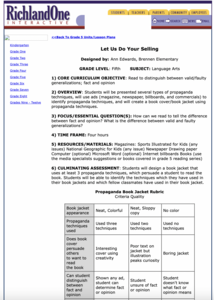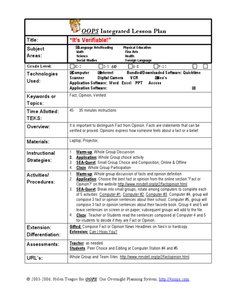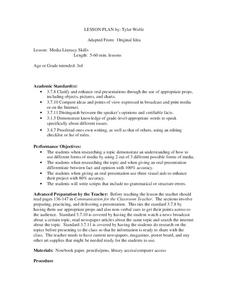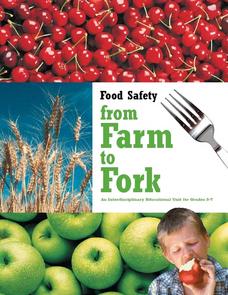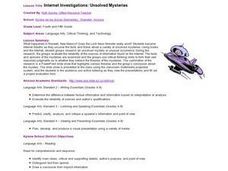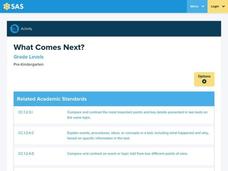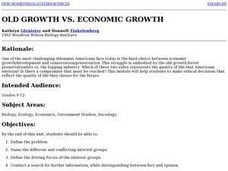Curated OER
Let Us Do Your Selling
Sixth graders analyze several types of propaganda techniques and create a book cover using the techniques. In this propaganda techniques lesson, 6th graders analyze the propaganda techniques used in various ads. Students analyze the...
Curated OER
The Vikings
Students research and explore Viking culture, distinguishing between fact and fiction, and examine their contribution to our society.
Curated OER
Understanding Stereotypes
Pupils confront age-related stereotypes, explore how stereotyping impacts their lives, and discuss how they can make changes to reduce over-generalizations, unfair assumptions, and critical judgments about people groups. They use a...
US House of Representatives
Black Americans in Congress Speak Their Mind
To conclude their study of Black Americans in Congress, groups select a statement made by one of the Members, examine the Member's profile on the provided link, and create a display that includes state represented, years of service, an...
Curated OER
"It's Verifiable!"
Students examine the differences between fact and opinion. They define fact and opinion, evaluate their favorite fact or opinion on a website, and in small groups write sentences using facts and opinions about school and their favorite...
Curated OER
Fact versus Opinion
Eleventh graders distinguish between fact and fiction in a one day selection of the Official Proceedings of the Alabama 1901 Constitution
Curated OER
Determining Author's Point of View: The Sneeches
Determine the author's point of view in a text. Young readers read Dr. Seuss' The Sneeches and identify the author's purpose in the story. They identify persuasive techniques in writing, asking and answering questions to better...
Curated OER
What Is the Nature of Science?
Students distinguish between scientific and everyday meanings of key words-theory, hypothesis, law, fact-and use in context. They recognize the variables that affect observation, data collection, and interpretation. They discover the...
Curated OER
Media Literacy Skills
You're on camera! Third graders find a news story and research it to get more information. Everyone uses their found information to write a script and create their own news broadcast!
Worksheet Web
Language – Debating
Having a debate doesn't mean you're fighting. Introduce middle schoolers to debate with a resource which distinguishes between an quarrel and a debate, describes the debate process and format, and presents some possible debate topics.
Curated OER
Lisa Leslie - Women's Basketball Star
Third graders read from their textbooks about Lisa Leslie, the famous American women's basketball star. They discuss the overall disparity of attention and salaries in women's sports compared to men's. They write facts and opinions...
Curated OER
Reading And Responding: Lesson 15 Nonfiction
Eighth graders examine a nonfiction selection in a teacher led instructional activity. They examine the author's purpose for writing the selection and identify the difference between fact and opinion. The compare and contrast expository...
Curated OER
Electrifying Franklin
Fourth graders research and present information about Benjamin Franklin's life and accomplishments. In this lesson on Benjamin Franklin, 4th graders review idioms and sayings written by Franklin then compare and contrast his various...
Curated OER
Why Do I Want All This Stuff?
Students identify two factors that determine consumer demand as well as substitutes and complements for selected goods and services. After examining advertisements, they distinguish between fact and opinion and explore the factors that...
Curated OER
The Atomic Bomb Dilemma
Students examine consequences of using atomic bomb in light of resulting peace, distinguish between fact and opinion and analyze sources to recognize bias and points of view, and assume role of reporter, critic, cabinet member, or...
News Literacy Project
Fighting Falsehoods on Social Media
It's time to stop misinformation in its tracks. Scholars take an online quiz to see how well they understand social media platforms' policies on spreading false information. After taking the quiz, pupils receive a score with an...
Curated OER
Food Safety From Food To Fork
Young scholars are introduced to the concept of food safety. In groups, they distinguish between fact and opinion and cause and effect while participating in a board game. They write an essay about what knowledge they gained and review...
Curated OER
8th Grade Reading Comprehension Success
Augment your eighth grade language arts curriculum with a thorough set of reading comprehension activities and assessments. Focusing on a variety of skills, including vocabulary in context, text structure, main idea, and author's style,...
Education Bureau of Hong Kong
Fundamentals of Critical Thinking
Analyzing arguments is key to critical thinking. Colorful slides teach viewers how to recognize the structure of an argument, the claims, and the validity of the evidence used to support an argument. Then, provided scenarios permit...
Curated OER
Active Reading with American History
Explore connections within and between informational texts with this lesson about encyclopedia articles. Middle schoolers write encyclopedia articles focusing on topics in American history. They discuss how to determine credibility...
Curated OER
Internet Investigations: Unsolved Mysteries
Young scholars conduct Internet research to investigate the facts and fiction of various unsolved mysteries. They examine the facts and opinions of the mysteries, and create a Powerpoint slide show to present the theories and the group's...
Pennsylvania Department of Education
What Comes Next?
Students listen to various books that contain a sidebar of illustrations and practice making predictions about events in each story. In this what comes next lesson, students differentiate fact from opinion across various texts. Students...
Curated OER
Conservation vs. Economic Growth
Investigate the choices people make between economic growth and personal growth and development using the ethical/decision making model. Small groups create and present a position paper describing their feeling for or against the...
Curated OER
Media Scrapbook
Students analyze the fundamental issues relating to Canadian parliamentary democracy through the exploration of media and public opinion. A scrapbook is created containing summaries of the work performed.


